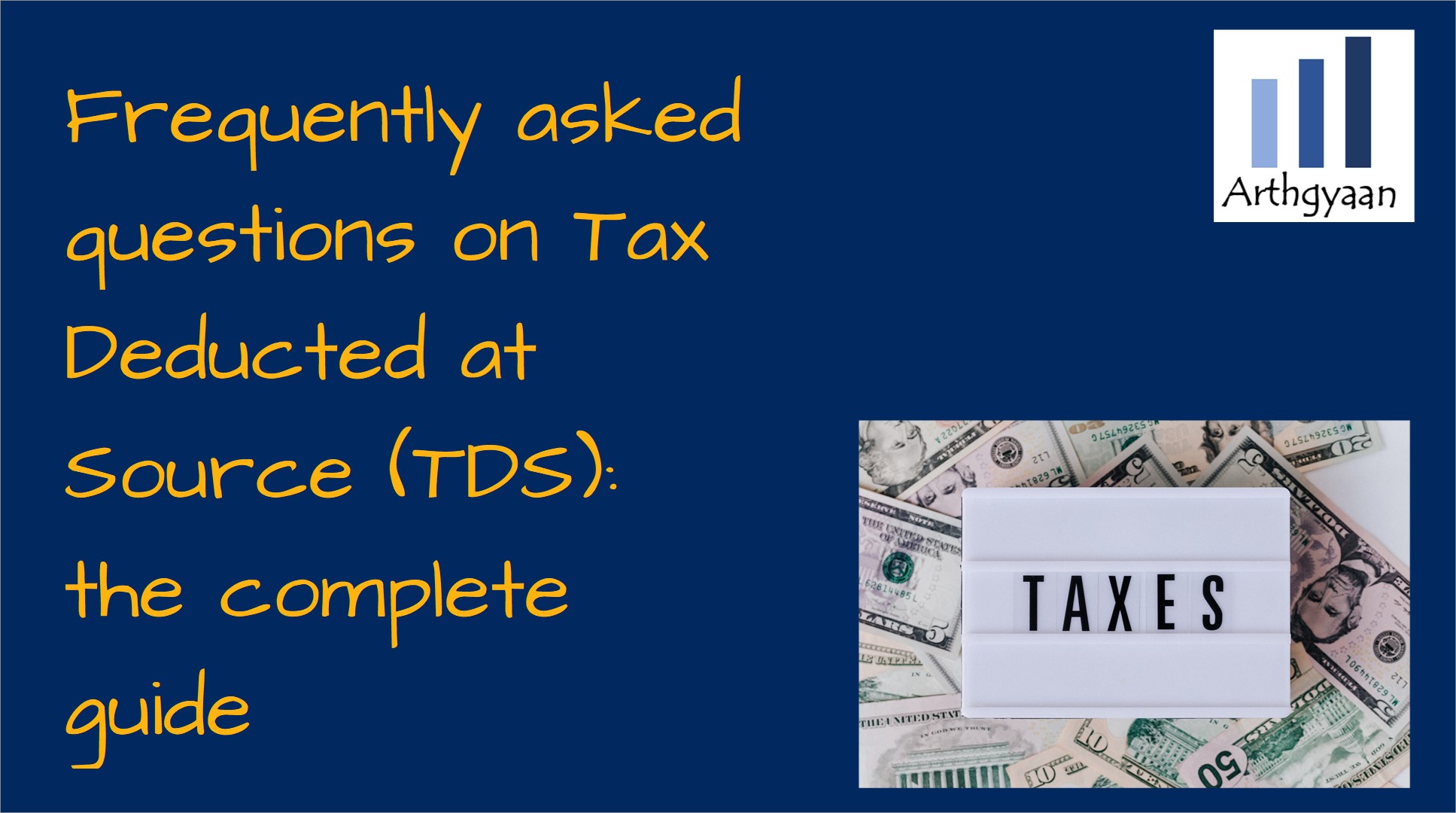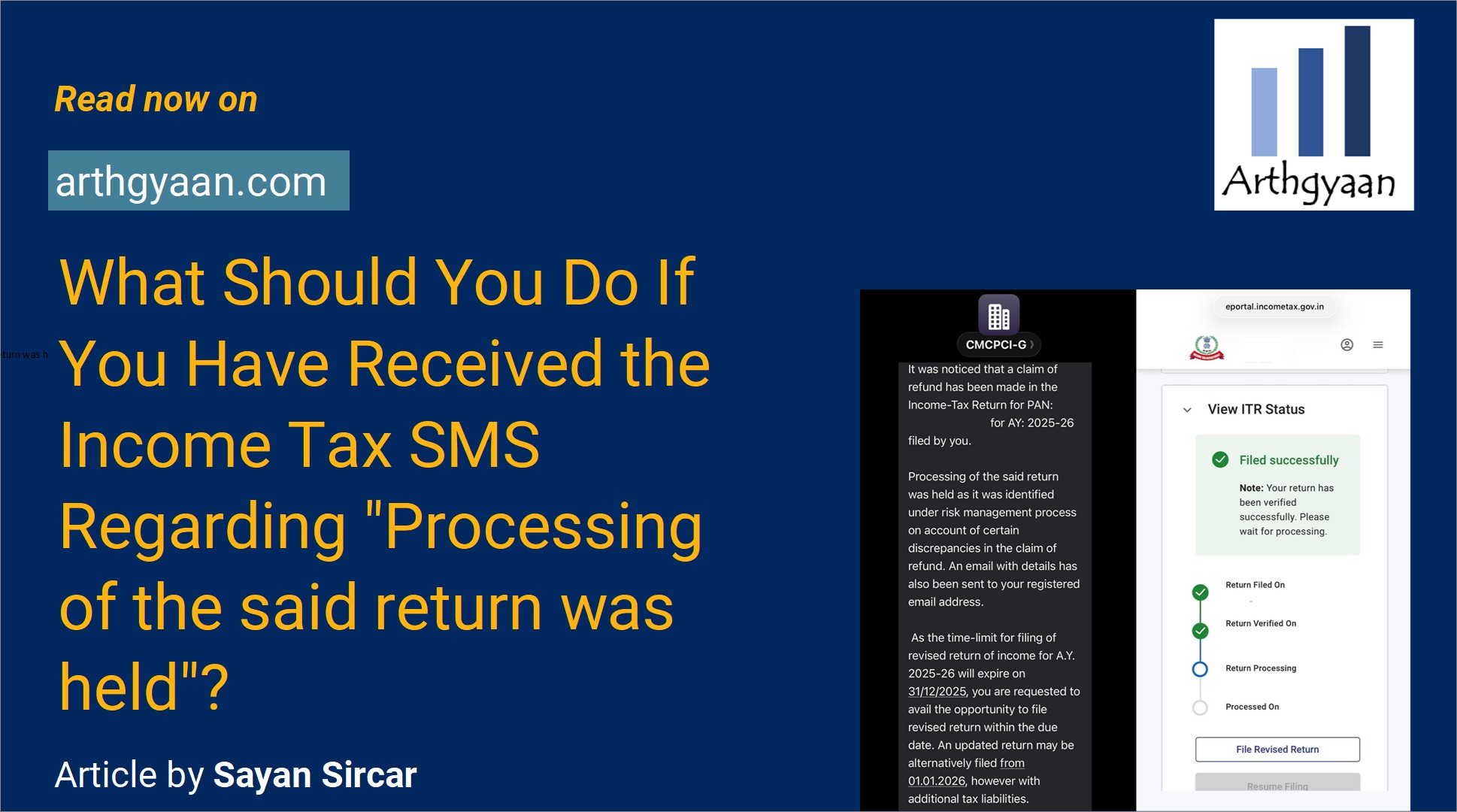Frequently asked questions on Tax Deducted at Source (TDS): the complete guide
This article compiles an exhaustive list of FAQs on the concept of Tax Deducted at Source (TDS).
This article compiles an exhaustive list of FAQs on the concept of Tax Deducted at Source (TDS).

Please use the Find feature of your browser to look for specific items of interest.
Tax Deduction at Source (TDS) happens when a bank, company or similar entity deducts some amount of money as tax before paying out interest, dividend or salary. The TDS amount is captured against the PAN of the income receiver and will then show up in the Form 26AS.
The TDS deductor must deposit the tax within a stipulated time in order to avoid late fees and penalties. The usual due date for TDS filing is by the 7th of the next month. Depending on the scenario, the late fee for delaing deposit can be 1.5% per month.
NRIs cannot submit Form 15G/H. Any TDS must be adjusted/refunded by tax filing.
TDS is tax collected in advance against income. Therefore when you file income tax return, the TDS amount is deducted from the total tax due and you need to only pay what is left. If excess tax has been deducted, then you can get a refund.
NRIs do not have any exemption for NRO savings account interest. Even though the interest is tax free up to Rs.10,000 per year under section 80TTA, TDS will be applicable at 20% + cess.
The tenant must deduct 5% of the rent as TDS if rent is more than Rs.50,000/month. The tenant needs to pay the TDS online via Form 26QC within the end of the following month for which rent is paid.
NRE FD is tax-free in India for both principal and interest and there is no TDS.
TDS can be refunded by filing tax returns in India by the NRI. The information about the TDS will be found in Form26AS in the TRACES portal. NRIs cannot submit Form 15G/H.
NRE accounts are tax-free in India while NRO is not. Since NRIS cannot file Form 15G/H to prevent TDS, there are two options:
TDS can be made zero by submitting form 15G/H in case income is below the taxable limit. In case of companies and salary income, TDS can be minimised by planning tax exemptions and tax deductions under 80C and other sections.
The buyer of the property has to deduct 1% of the sale value as TDS and deposit that to the income tax authorities in case the sale proceeds exceed Rs.50 lakhs.
Click here to read the related article.
Under Section 194C, TDS is applicable for contractors if the amount exceeds Rs.30,000 one-time or Rs.100,000 for the whole year. The TDS rate is 1% for individuals / HUF and 2% for all others.
The property buyer should deduct TDS at 1% if the sale value of immovable property exceeds 50 lakhs. The TDS is submitted against the PAN of the seller using Form 26QB. The concept of TDS on immovable property is a lengthy one and we have an entire article covering it.
Click here to read the related article.
TDS is calculated against salary based on the salary amount and applicable tax deductions. There is no TDS in case the expected income is below the taxable limit. Above the taxable limit the rate of TDS goes from 5% to 30% as per the normal tax slabs.
TDS is deducted at 10% for interest income above Rs.5,000/year for NBFC or company FDs.
TDS at the rate of 30% is applicable for income above Rs.10,000 per year.
The second i.e. the current company must be provided the salary and tax saving investments details of the previous company so that they can adjust TDS accordingly. Without this declaration, the second company does not have any way of knowing the correct income and tax deductions availed. This will lead to lower TDS and therefore interest on the extra tax to be paid when filing is done.
First, you need to apply for TAN in case the seller is NRI. If the seller is a resident Indian, PAN would jave sufficed for TDS. Second, the TDS rate will be 20%, plus cess, if the property is held for at least 2 years by the NRI (long term capital gains). Otherwise the TDS rate is 30% plus cess. Third, there is surcharge on TDS of at most 15%, in case the sale value is more than Rs.50 lakhs.
To file the TDS, the tax must be deposited by the buyer within 7 days of the month end on which TDS was deducted. The TAN should be surrendered after this to avoid filing nil returns every quarter after this. Note: As per Budget 2023, TAN for property purchase from an NRI is no longer compulsory.
For NRIs the TDS rate is 30%. Otherwise the rules and threshold is the same as for resident Indians.
For banks and post office, 10% TDS is calculated for FD interest income exceeding Rs.40,000 for resident Indians. For senior citizens (above 60 years), this threshold is Rs.50,000 a year. You need to file Form 15G (< 60 years age) and 15H (> 60 years age) in case your taxable income is expected to be below the minimum amount to prevent TDS. Usually the forms need to be submitted in April with running FDs and on as-is basis for new FDs. The TDS rate will be 20% in case PAN number is not provided with the FD.
For a property deal, the buyer of the property has to deduct 1% of the sale value as TDS and deposit that to the income tax authorities in case the sale proceeds exceed Rs.50 lakhs.
If the deal is cancelled, the seller will have to reimburse the TDS to the buyer since the seller will get a TDS refund during tax filing as the property was not sold. The buyer will not get a TDS refund from the government.
Since TDS is applicable above Rs.40,000 for FD, submitting 15G/15H to the bank will prevent tax to be deducted.
NRIs are subject to TDS at 30% (plus cess) on rental income in India under Section 197.
Click here to read the related article.
You can request the tax deductor not to deduct tax i.e. stop TDS by declaring that your income is expected to be below the taxable limit. For this you need to submit Form 15G for individuals and Form 15H for senior citizens. This filing has to be done in advance of the deduction since nothing can be done once TDS is already deducted. Form 15G/H should be submitted only if the expected total income for the year is below exemption limit.
TDS is not applicable on the post office monthly deposit scheme (POMIS).
For bonds purchased from RBI Retail Direct portal, there is no TDS at any time either on interest or principal for resident Indians. NRIs investing via NRO accounts will have the usual 30%+cess TDS on the interest amount.
For dividends below Rs.5,000/year, there is no TDS. Above Rs.5,000 there is 7.5% TDS. This TDS applies to IDCW payout, transfer and reinvestment plans.
There is no TDS on National Savings Certificate (NSC).
Remittance under RBI’s Liberalised Remittance Scheme (LRS) is usually used for paying for foreign travel, college education and investing abroad. Since 1st October, 2020 any amount remitted above Rs.7 lakhs/year comes under Tax Collected at Source (TCS), instead of TDS. The concept is same as TDS as the remitting bank will deduct 5% of the amount above Rs.7 lakhs. The TCS amount will show up in the Form 26AS/AIS of the remitter and can be claimed in tax filing as a refund.
This is therefore not a tax that needs to be paid since the TCS amount is adjusted against due taxes. Also, the TCS is applicable only on the amount above Rs.7 lakhs a year. So if you remit Rs.8 lakhs, the TCS is 5% of Rs.1 lakh i.e. Rs.5,000.
As per Budget 2023, the TCS rate on LRS has been increased to 20% without the Rs.7 lakhs limit.
Click here to read the related article.
For resident Indian investors, there is no TDS on selling mutual funds. For NRIs, there is TDS of 20% post indexation for Long-term Capital Gains (LTCG) and 30% for Short-term capital gains (STCG).
There is no TDS if the amount of dividend/year is below Rs.5,000 per company. Above Rs.5,000/year, there is 10% TDS (20% if PAN is not supplied) for investors. For NRIs, the TDS rate will be 20% plus surcharge and cess.
TDS rates for NRIs vary between 10% (shares, bonds, equity-oriented MF) to 30% (real estate) with intermediate values of 15% and 20% also applicable.
Click here to read the related article.
First link the PAN with the account. Then contact the bank which deducted TDS to file a correction against the TDS linking that with the PAN number. Now the TDS will show up in Form 26AS. You can offset or get a refund against the TDS while tax filing.
TDS certificates are issued by the entity deducting the TDS to you. These are available as Form 16 (for employer to employee for TDS on salary) or Form 16A (for all other cases).
Form 16A is issued as the TDS certificate in case of sale of immovable property. This form is given to the NRI seller. For resident Indian sellers, it is called Form 16B.
Click here to read the related article.
Form 16B is issued as the TDS certificate in case of sale of immovable property. This form is given to the resident Indian seller. For NRI sellers, it is called Form 16A.
Click here to read the related article.
Individuals without PAN or more likely with inoperative PAN numbers, are charged higher TDS under Section 206AA. The TDS rate will be, as per Section 206AA:
Transactions on which the higher TDS is applicable include property sales, rental income, capital gains on mutual funds and NRO deposits. Section 206AA is applicable to both resident and NRI taxpayers.
Whe you purchase property, TDS needs to be paid to the government and the balance to the builder. For example, if the agreement value is Rs.60 lakhs and TDS rate is 1% (sometimes it can be 0.75% as well), then Rs.60,000 must be paid to the government and the balance Rs.59.4 lakhs need to be paid to the seller.
Tenants must deduct 30% (plus cess) of the rent as TDS and submit to income tax quarterly in case the landlord is an NRI.
You can file your income tax returns and show the TDS (via input from Form 26AS or AIS) against other taxes due from other income sources or capital gains. If there is a refund, it will be paid out once the tax return is processed.
The TDS for the entire financial year will show up in the Form 26AS as well the Annual Information Statement (AIS) available from the Income Tax website. The banks or other institutions will generally send a TDS certificate either quarterly, as-is or yearly basis capturing the details of the TDS.

Published: 23 December 2025
6 MIN READ

Published: 18 December 2025
8 MIN READ
1. Email me with any questions.
2. Use our goal-based investing template to prepare a financial plan for yourself.Don't forget to share this article on WhatsApp or Twitter or post this to Facebook.
Discuss this post with us via Facebook or get regular bite-sized updates on Twitter.
More posts...Disclaimer: Content on this site is for educational purpose only and is not financial advice. Nothing on this site should be construed as an offer or recommendation to buy/sell any financial product or service. Please consult a registered investment advisor before making any investments.
This post titled Frequently asked questions on Tax Deducted at Source (TDS): the complete guide first appeared on 08 Jan 2023 at https://arthgyaan.com